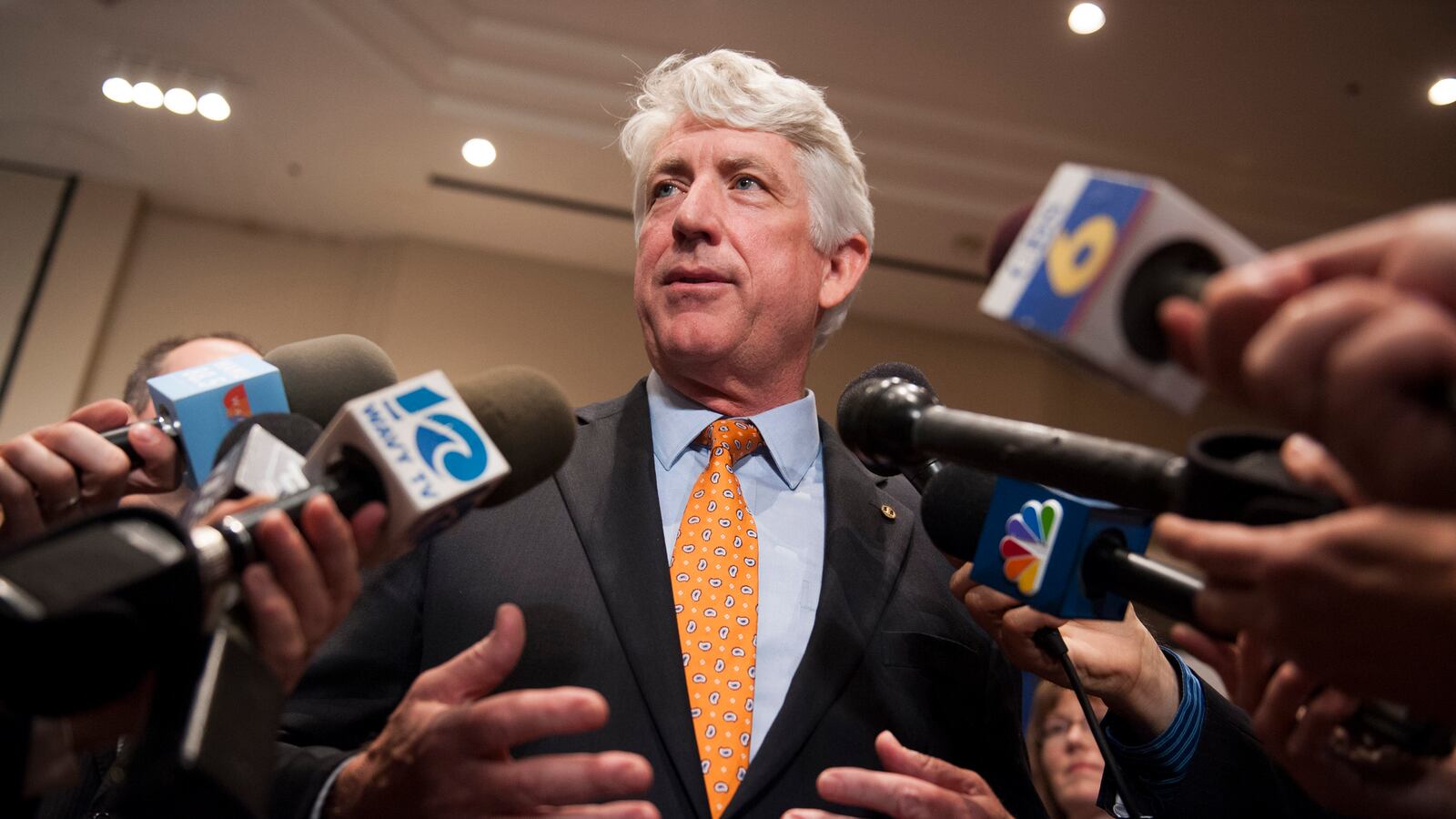Now this is very interesting indeed: It suddenly looks as if the Democrat may win the attorney general election in Virginia. It seems they found a missing ballot box from Richmond on Monday afternoon, and Mark Herring vaulted to a 115-vote lead over Mark Obenshain, out of 2.2 million cast. The counting of the provisional ballots is supposed to end Tuesday, and then there will be a recount, if the tally is within 1 percent (it is) and if the loser requests it. But as of Monday afternoon, those following the proceedings closely said it seems highly unlikely that Obenshain can make up the difference, narrow as it is.

Is this a big deal? You bet it is. If Herring wins, the Democrats will have the run of Virginia. The governor, lieutenant governor, attorney general, and both senators will be Democrats. In Virginia! That hasn’t happened since 1969, which was a completely different political universe. One of those senators, Harry F. Byrd Jr., was a thoroughgoing segregationist. So that’s good news for the Democratic side.
And likewise it’s terrible news for the Tea Party. The Virginia GOP went ultra-hard right this year—instead of primaries, it held a nominating convention over-attended by ideologues who chose the medieval Ken Cuccinelli, about whom we know; the Bronze Age lieutenant governor candidate E.W. Jackson, who made a series of outlandish and reactionary comments and got mopped up by double digits; and Obenshain. He of course underwent far less national observation and scrutiny than Cuccinelli did, and he drew far fewer cameras than the bombastic Jackson, but his views are essentially indistinguishable from the gubernatorial candidate’s—transvaginal probes, criminalization of any failure by a woman to report a miscarriage to the police, hating on gay people, the whole ball of fetid, intolerant wax.
Now here’s the important thing: Because the governor of Virginia is limited to one term, attorneys general are always likely to have a decent shot at being the next governor just four short years hence. Bob McDonnell, the governor now, was an AG. Ditto Cuccinelli. Obenshain as AG would clearly be (I won’t use the past tense just yet) positioned to be the next governor come 2018 and kill the commonwealth’s participation in the health-care expansion and implement the Cuccinelli agenda four years later. So a Herring win would seem to make a future Obenshain gubernatorial term that much less likely.
It’s not for want of trying. As recently as Friday, the Virginia State Board of Elections, controlled by Republicans, voted to change a rule in the law that covers how provisional ballots are scrutinized. This business is a little technical and confusing, but basically the question revolved around whether a voter had to be present if he or she wanted the government body going through the provisional ballots to count his or her vote. Heavily Democratic Fairfax County and the state disagreed about both the rule and past practice, and the state overruled the county, which appeared to give Obenshain the advantage because the ruling would have the effect of making it harder for Fairfax voters, who are more Democratic than not, to have their ballots counted. That ruling is still in effect and still would help Obenshain, but it now seems mooted by the late developments from Richmond.
When I wrote last week that Democrats shouldn’t get overly excited about Virginia, I did so operating on the assumption that Obenshain was going to win, as he was slightly ahead at that point. His victory would give the hard right a significant toehold in Richmond. An attorney general can do a lot of things to stay in the news and to help chart a state’s course, even when the governor is from another party. He can, well, file lawsuits against Obamacare, for starters. He can think up annoying ways to put his state on the climate-change-is-a-hoax side of the argument, to keep black people from voting (another of Obenshain’s fixations), and much more.
So now I wish to revise and extend my remarks. If the Virginia GOP ends up going 0-for-3 here, that’s a watershed moment, I think. I know; we’re just talking about a few hundred votes shifting around. But winning is winning and losing is losing. Bill Buckner only missed that ball by 2 inches. If the Republican Party of Virginia has no statewide officeholder for the next four years—and of course if the Democrats from McAuliffe on down do their jobs adequately—it would, speaking of climate change, alter the political temperature of the state considerably between now and 2016. Virginia’s swing voters would just start getting used to the fact that their state was turning, or maybe even had turned, blue.
There’s still a ways to go here. While Tuesday night is the deadline for announcing the results including provisional ballots, the official re-canvass won’t be done until November 25. Voting-rights expert Rick Hasen wrote in Slate on Monday night that if Obenshain ends up on the wrong end and contests the results, he can request a recount. He would have until early December to do so. Lots of mischief can be made between now and then. Under Virginia election law, the thing could even get thrown to the Republican-controlled state Legislature to decide. After that, it may all end up in federal court.
But if the results as of Monday evening hold, 2013 will stand as the most embarrassing election in Virginia for Republicans in years. Maybe in recent history. So maybe Virginia is for lovers. Of sanity.






